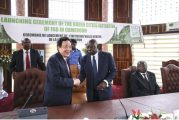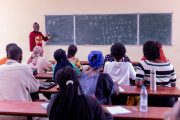Categories
Recent Posts
- Southern Cameroons refugees in Nigeria receive farm seedlings
- Douala: Investment Forum wraps up with honors for investment champions
- Understanding the Biya Francophone regime’s support for the Israeli genocide in Gaza
- US: Prosecution lays out ‘criminal conspiracy’ as Trump’s hush money trial opens
- FAO formally launches Green Cities Initiative in Cameroon
Archives
- April 2024
- March 2024
- February 2024
- January 2024
- December 2023
- November 2023
- October 2023
- September 2023
- August 2023
- July 2023
- June 2023
- May 2023
- April 2023
- March 2023
- February 2023
- January 2023
- December 2022
- November 2022
- October 2022
- September 2022
- August 2022
- July 2022
- June 2022
- May 2022
- April 2022
- March 2022
- February 2022
- January 2022
- December 2021
- November 2021
- October 2021
- September 2021
- August 2021
- July 2021
- June 2021
- May 2021
- April 2021
- March 2021
- February 2021
- January 2021
- December 2020
- November 2020
- October 2020
- September 2020
- August 2020
- July 2020
- June 2020
- May 2020
- April 2020
- March 2020
- February 2020
- January 2020
- December 2019
- November 2019
- October 2019
- September 2019
- August 2019
- July 2019
- June 2019
- May 2019
- April 2019
- March 2019
- February 2019
- January 2019
- December 2018
- November 2018
- October 2018
- September 2018
- August 2018
- July 2018
- June 2018
- May 2018
- April 2018
- March 2018
- February 2018
- January 2018
- December 2017
- November 2017
- October 2017
- September 2017
- August 2017
- July 2017
- June 2017
- May 2017
- April 2017
- March 2017
- February 2017
- January 2017
- December 2016
- November 2016
- October 2016
- September 2016
- August 2016
- July 2016
- June 2016
Featured
 Understanding the Biya Francophone regime’s support for the Israeli genocide in Gaza
Understanding the Biya Francophone regime’s support for the Israeli genocide in Gaza  Poverty under Biya: Cameroonians embrace Chinese language for brighter futures
Poverty under Biya: Cameroonians embrace Chinese language for brighter futures  Cameroon is broken: Who can fix it?
Cameroon is broken: Who can fix it?  Ethiopia: U.S Senator Cardin Statement on the Killing of Bate Urgessa
Ethiopia: U.S Senator Cardin Statement on the Killing of Bate Urgessa  Battle for the Unity Palace: ANNOUNCEMENT!
Battle for the Unity Palace: ANNOUNCEMENT!
Most Commented Posts
 4 Anglophone detainees killed in Yaounde
4 Anglophone detainees killed in Yaounde
19 comments Chantal Biya says she will return to Cameroon if General Ivo Yenwo, Martin Belinga Eboutou and Ferdinand Ngoh Ngoh are sacked
Chantal Biya says she will return to Cameroon if General Ivo Yenwo, Martin Belinga Eboutou and Ferdinand Ngoh Ngoh are sacked
13 comments Anglophone Nationalism: Barrister Eyambe says “hidden plans are at work”
Anglophone Nationalism: Barrister Eyambe says “hidden plans are at work”
12 comments The Anglophone Problem – When Facts don’t Lie
The Anglophone Problem – When Facts don’t Lie
12 comments Largest wave of arrest by BIR in Bamenda
Largest wave of arrest by BIR in Bamenda
10 comments
Latest Tweets
Featured
-

Southern Cameroons refugees in Nigeria receive farm seedlings
-

Douala: Investment Forum wraps up with honors for investment champions
-

Understanding the Biya Francophone regime’s support for the Israeli genocide in Gaza
-

US: Prosecution lays out ‘criminal conspiracy’ as Trump’s hush money trial opens
-

FAO formally launches Green Cities Initiative in Cameroon
-

Football: Barcelona wants Clasico replay if Yamal ‘ghost goal’ call wrong
-

Poverty under Biya: Cameroonians embrace Chinese language for brighter futures
© Cameroon Concord News 2024
22, March 2018
Federal Republic of Ambazonia: French Cameroun’s banning and burning of bikes is a crazy strategy 0
The policy of burning commercial bikes in villages and banning same in towns and enclave communities is clearly a very primitive and hopeless approach to restore peace and security. For one thing, it provokes anger and a thirst for vengeance in young people in restive areas in Southern Cameroons. By stopping the circulation commercial bikes and setting dozens of such bikes ablaze, the government has put out of business, tens of thousands of young people, many of them university graduates who depend on motor bikes popularly known as “Bend Skin” or “Okadas” as their only means of livelihood. Their families and dependants cannot have good meals and will not be able to pay various bills because their only providers have been artificially incapacitated.
While Divisional Officers (DO), Senior Divisional Officers (SDO) and regional governors west of the Mongo had repeatedly banned motorbikes and ordered night time curfews, the problems they have attempted to solve have not gone away. Rather, their actions have unfortunately created more difficulties and untold hardship for the populations. These actions have also gone a long way in radicalizing even the most moderate minds and pushed young people to invent other ways of hurting the government they so much detest. While, the population and critics have been vocal against the slash and burn strategy of the authorities, the new minister of territorial administration, Paul Atanga Nji, has not made things any better for the restive populations and communities. His first stamp as minister of interior on his own people was the banning of bikes in the main commercial towns of Kumba, Muyuka and other localities in the South West Region.
How insensitive could the new MINAT boss be? How could he place a complete ban on such a huge population and expect the sprawling and volatile city of Kumba to respect the rather punitive order? How could the minister go so low as to ignore the governors, SDO and DOs to ban bikes? What then is the role of the local administrators? His decision has been counterproductive in Kumba and this is having a huge impact on his reputation and authority. Could he risk a mass protest and the chain effect it could have if the “K” Town Boys descend on the streets to protest against any eventual enforcement of the ban? Paul Atanga’s style is reminiscent of the vicious and pitiless reign of terror that Cameroonians knew under Forchive, the then secret police boss of Bamoun extraction (under Amadou Ahijo and Paul Biya, ) who Cameroonians hate to remember. Forchive’s extremely repressive tactics of caging dissidents is a monolithic hang over which Paul Atanga Nji appears unable to shake off. By compelling governors and other administrators to feed him with security reports twice a day, it smacks of a police state of the past whereby innocent citizens were victimized, just to satisfy the bosses and prove that they were working hard to weed out enemies of the state or terrorists and preserve the security of the state.
BOOMERANG
Apart from the disgrace inflicted on MINAT by the daring Kumba bike riders, the overwhelming use of force to control movements has given birth to yet another extreme weapon against the government. A campaign to stop state-owned vehicles from plying the roads of Southern Cameroons is now being fanned. This is a first volley the Southern Cameroons pro-restoration campaigners have fired against the Atanga Nji rule. French language daily, Le Messager, vividly captured it well when it said that the Atanga Nji Paul formula could be greatly problematic.
Look back into East Cameroun history and you can easily see how francophone, especially in the Bamileke and Bassa areas, suffered the same atrocities that some Southern Cameroonian villages are currently experiencing. At the time, French soldiers led a bloody campaign against UPC nationalists who were branded as Terrorists or Marquisards. Villages were razed and heads were chopped off and displayed at road junctions to scare people and deter them from joining the revolution against the brutal French rule. Apparently, those ruling this country have forgotten their Cameroon history lessons and are bent on pursuing their “slash and burn” policy to the end. We say it is wrong. It is a wrong strategy to start eating up your own children. The ego of those in power cannot be too big to let go peace and justice. Dialogue, genuine dialogue is the right way to go. Various relevant organizations have echoed this as the right formula to restore lasting peace in the country. They include the UN, Commonwealth, AU, Amnesty International, International Crisis Group etc. But despite this crucial advice, President Paul Biya has remained faithful to his initial position that there will be no discussion on the form of the state. Those championing the crusade for good governance and autonomous rule for Southern Cameroons have been branded as terrorists. They are being hunted down, chased into exile and moderates are being pushed into extremism by the high handedness of administrative and military officials.
It has not been long since President Paul Biya declared war in his country. In effect, this is war on his people. The war is claiming lives and draining the country’s resources, and the end is not in sight. How the government intends to win such a war without the support if the population is what history is waiting to record as the world’s first. The same world history has shown repeatedly that after all the fighting, hatred, killings and excesses would have taken place, the warring parties will inevitably end up at the negotiating table. So why not just go to the negotiating table now and talk instead of the crazy decisions that are being taken on a daily basis?
By Sesekou Ashu Isong